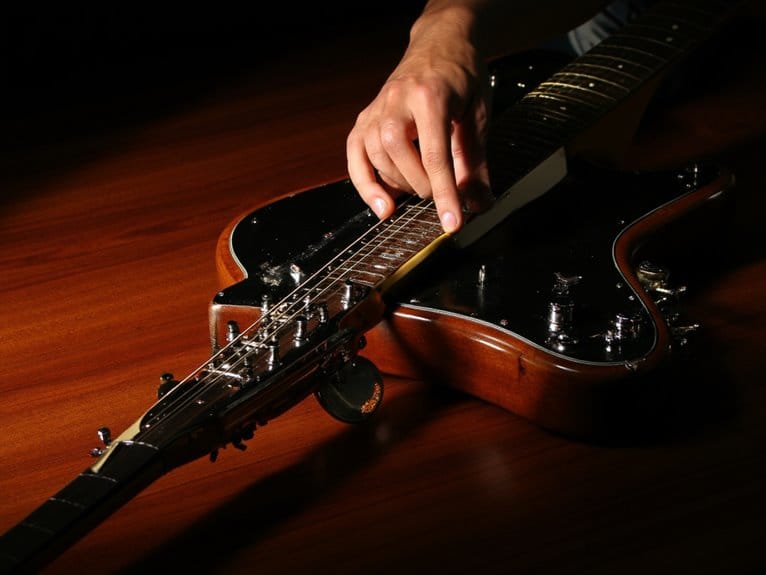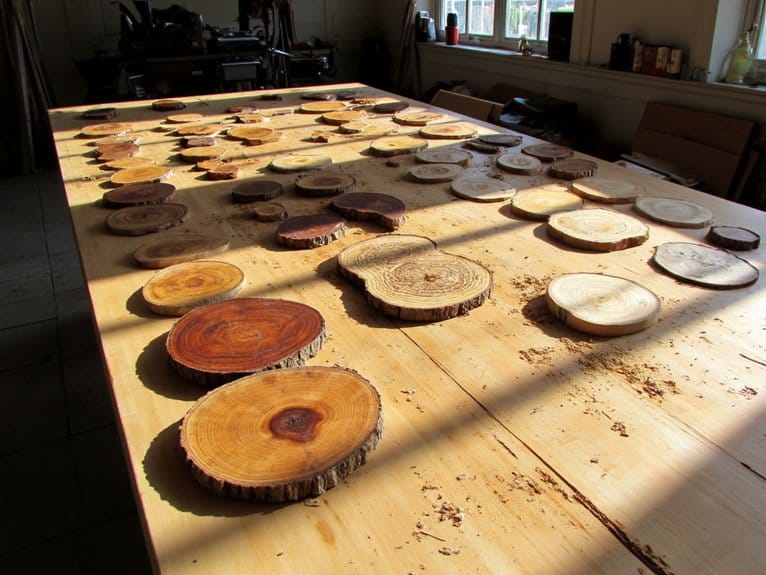Do American Fenders Hold Value?
American Fenders, particularly vintage models from the 1950s and 1960s, hold significant value in the collector's market due to their rarity, historical significance, and enduring popularity among guitar enthusiasts. Factors such as condition, originality, and provenance also play a pivotal role in determining the resale value of these instruments. The surge in demand has led to a corresponding increase in market value, with certain models and years commanding premium prices. As the market continues to evolve, understanding the intricate dynamics of vintage Fender valuation becomes essential for collectors, investors, and enthusiasts alike, with more insights waiting to be uncovered.
We are supported by our audience. When you purchase through links on our site, we may earn an affiliate commission, at no extra cost for you. Learn more.
Vintage Fender Market Trends
What factors are driving the surge in demand for vintage Fender guitars, and how are these trends impacting the market value of these highly sought-after instruments? The vintage Fender market is experiencing a significant upswing, driven primarily by the increasing number of Fender collectors and guitar enthusiasts seeking rare and unique instruments. This surge in demand has led to a corresponding increase in market value, with certain models and years commanding premium prices. The rarity and exclusivity of vintage Fenders, combined with their rich history and cultural significance, have created a perfect storm of demand and scarcity, driving up prices and solidifying their status as highly valuable collector's items.
Factors Affecting Resale Value
Several key factors, including the guitar's original condition, provenance, and rarity, substantially influence the resale value of vintage Fender guitars. The condition of the instrument is vital, as any signs of wear, damage, or restoration can profoundly impact its value. Provenance, or the guitar's history of ownership, can also increase its desirability and value. Rarity is another pivotal factor, with limited production runs or unique features commanding higher prices. Model years and production numbers also play a vital role, with certain periods or batches being more sought after than others. Additionally, the guitar's originality, including its electronics, hardware, and finish, is essential in determining its resale value. By understanding these factors, collectors and enthusiasts can make informed decisions when buying or selling vintage Fender guitars.
The 50s and 60s Premium
As a result of their iconic status and limited production numbers, vintage Fender guitars from the 1950s and 1960s command a significant premium in the collector's market. These instruments, coveted by Tone masters and enthusiasts alike, are highly sought after for their unique sonic characteristics and historical significance. The 1950s, in particular, saw the introduction of pioneering models such as the Telecaster and Precision Bass, which have since become benchmarks for electric guitar design. The 1960s, meanwhile, witnessed the rise of the Burst Brothers, a group of highly prized instruments known for their distinctive sunburst finishes and exceptional playability. As a result, these vintage Fenders continue to hold significant value, driven by their enduring popularity and the ongoing quest for tone perfection.
Condition and Originality Matters
Most vintage Fender guitars that have been meticulously maintained in their original condition, with all components intact and minimal signs of wear, command the highest prices in the collector's market. Fender collectors prioritize instruments that have avoided heavy modifications, refinishing, or replacement parts, since these alterations can markedly decrease the guitar's value. In contrast, guitars that have undergone restoration can still hold value, but the cost of restoration must be factored into the overall price. High-quality restorations can recoup their costs, but poorly executed work can lead to substantial devaluation. Consequently, originality and condition play a vital role in determining the value of a vintage Fender, and collectors are willing to pay a premium for instruments that have been well-preserved.
Rarity and Limited Editions
Beyond the significance of condition and originality, the scarcity of certain Fender models and limited-edition releases also substantially impact their value in the collector's market. Limited supply and collector demand are key factors driving up the value of rare and hard-to-find Fenders. For instance, limited-edition runs, special collaborations, or anniversary models with unique features or aesthetics can command a premium price due to their exclusivity. The rarer the model, the higher the demand, and subsequently, the greater the value. Fender's limited-production models, such as the American Ultra or the Custom Shop creations, are prime examples of this phenomenon. As a result, collectors and enthusiasts are willing to pay top dollar for these rare gems, making them a valuable addition to any guitar collection.
Celebrity Ownership Impact
Fender guitars previously owned by famous musicians or used in iconic recordings can dramatically increase their value, thanks to the allure of their provenance and the desire of collectors to own a piece of music history. Iconic owners like Eric Clapton, Jimi Hendrix, and Stevie Ray Vaughan have all contributed to the star power surrounding Fender guitars. The association with legendary artists can augment the instrument's status, making it a coveted item among collectors. This phenomenon is not unique to Fenders, as celebrity ownership can impact the value of any item. However, the cultural significance and nostalgic appeal of Fender guitars make them particularly susceptible to the influence of celebrity ownership, driving up their value and desirability.
The Role of Provenance
The provenance of a Fender guitar, documenting its ownership history and association with remarkable events or artists, serves as a critical factor in establishing its authenticity and value. Authentic documentation of a guitar's past can substantially impact its desirability and worth. A guitar's historical importance, for instance, can be greatly augmented if it was previously owned by a famous musician or used in a notable recording.
- Ownership history: Documentation of previous owners, particularly if they are well-known musicians or industry professionals.
- Association with remarkable events: Evidence of the guitar's use in historic concerts, recordings, or other memorable events.
- Authentic documentation: Verifiable records, such as receipts, certificates, or photographs, that confirm the guitar's provenance.
Market Fluctuations and Trends
Several factors, including supply and demand, economic conditions, and cultural trends, collectively influence the market value of American Fenders. Market fluctuations can substantially impact the value of these instruments, as shifts in economic cycles can alter demand and, subsequently, prices. Collector sentiment also plays a vital role, as enthusiasts' perceptions of the brand and its history can either bolster or diminish market value. Additionally, cultural trends can influence the desirability of specific models or eras, leading to fluctuations in value. As a result, American Fender values can experience both upward and downward trends, making it essential for collectors and investors to stay attuned to market shifts and adjust their strategies accordingly.
Investment Potential and ROI
One of the most compelling aspects of American Fenders is their impressive investment potential, with many models consistently delivering high returns on investment (ROI) over time. This is due to their rarity, condition, and demand, making them a solid addition to any investment portfolio. In terms of financial returns, American Fenders have proven to be a lucrative investment strategy.
- Consistent Appreciation: American Fenders tend to appreciate in value over time, making them a stable investment option.
- Low Risk: The demand for vintage guitars is high, reducing the risk of investment in American Fenders.
- Diversification: Adding an American Fender to your investment portfolio can provide a unique diversification strategy, reducing overall risk and increasing potential returns, allowing you to take the plunge into the world of alternative investments.






